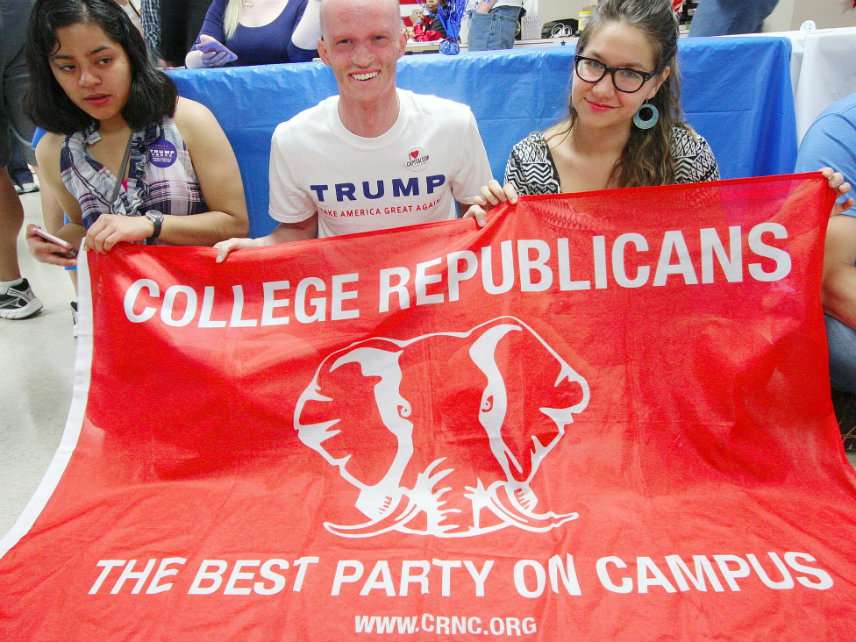College Republicans Get In Huge Trouble for Posting 'I.C.E. I.C.E. Baby' Signs
But dumb, offensive speech still isn't violence.

The College Republicans at the University of California, Merced advertised their club last month with signs that read "I.C.E. I.C.E. Baby" and provided the phone number for Immigration and Customs Enforcement. Now the student government is considering defunding them and similar organizations, in part because College Republicans might use those funds to attend conservative conferences and spread hateful rhetoric on campus.
The initial advertising campaign provoked a response from school administrators several days after the incident. The officials condemned the group's "bigoted and hateful" tactics but reminded students that "as nasty as the club's signs were, they are protected by the First Amendment."
When the student legislature got wind of this, it released a statement saying it "would like to apologize to the student body for not taking a definitive stance against the violent actions from the College Republicans sooner." It continued: "Members of the senate believe that we should not tolerate or support any individual or organization that perpetuates hate speech on our campus. Direct endangerment of any kind should be condemned on this campus."
If any students saw the I.C.E. phone number on the College Republicans' sign and did, in fact, call it to report an undocumented student who was then deported or questioned, that would indeed be direct endangerment. But the reference to "hate speech" takes the statement in a different direction, veering toward the "words are violence" jargon that has become all too common on campuses.
On March 21, the legislative branch of the student government released a statement lamenting the fact that another student government division––the Inter Club Council––granted funding to the CRs to attend the California College Republicans state convention, saying that the conference "will enable their organization to network with individuals that share their harmful views" and that those hateful sentiments would be brought back to the Merced campus.
The College Fix reports that "Senators asked students to attend an April 4 Senate meeting to discuss 'financial bylaw changes that will prohibit student fees from funding partisan organizations on campus, a policy implemented on other UC campuses.'" This meeting was allegedly coupled with a discussion of the "formal timeline of the violent actions committed" by College Republicans, making it pretty clear that the discussion of withholding funds was related to the conduct of these conservative provocateurs. It's not clear how a prohibition on student fee funding for partisan organizations will be applied, or which organizations will be considered partisan––would a pro-choice group, for example, fall into that category? A genuinely neutral removal of student funds for all political organizations would be constitutionally acceptable, but any discrimination on the basis of a group's point of view could run into First Amendment problems.
In an April 16 statement, the California College Republicans say they "view any attempt to defund CRUCM as an explicitly biased attack against conservative values and ideas….Any repercussive action by UC Merced student government or campus administration is an assault on First Amendment rights." They don't say whether they plan to take legal action if they lose their fees, but they're hinting that this issue won't be resolved quietly. This is, after all, the same litigious College Republicans chapter that threatened to sue their school when administrators quoted high security fees for bringing the right-wing pundit Ben Shapiro to campus.
Fears of deportation, or of having their Dreamer or Temporary Protected Status (TPS) revoked, are real for many students. A call to I.C.E. from an antagonistic fellow student would be life-altering to some in UC-Merced's student body. But even shitty, loathsome speech is protected by the First Amendment. The more we equate words with violence, the easier it becomes to justify suppressing speech––and who would be in charge of drawing those boundaries for what type of speech is allowed? The best responses to the College Republicans' flier will consist of nonviolent activism and other forms of speech, not measures that chip away at everyone's First Amendment rights.


Show Comments (211)